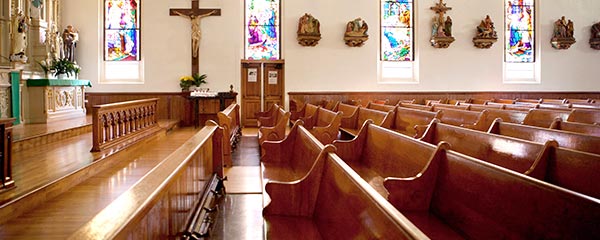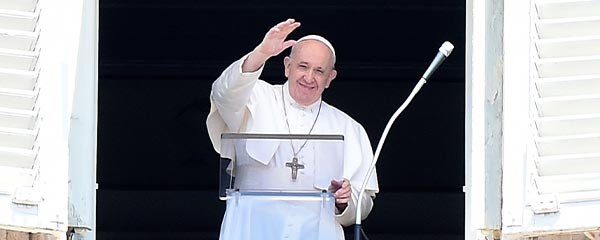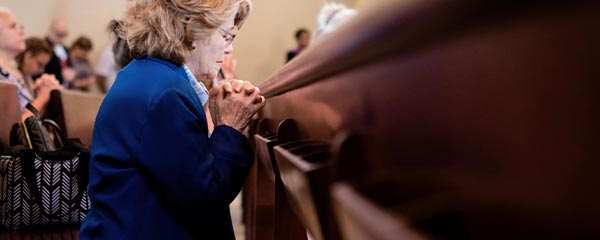Story Highlights
- 48% of Americans said religion was very important in own life in 2020
- More in 2020 said religion is increasing its influence in U.S.
- Record-low religious service attendance, either in person or remotely
WASHINGTON, D.C. -- The coronavirus pandemic has had less effect on Americans' personal religiosity than on their belief that religion has a greater influence on American life. U.S. adults' views of the importance of religion in their lives and their religious identification were unchanged in 2020, while their attendance at religious services and membership in a church, synagogue or mosque declined slightly.
Yet, there has been an uptick in the percentage of Americans who think religion as a whole is increasing, rather than losing, its influence on American life, a pattern seen at other times of national crisis.
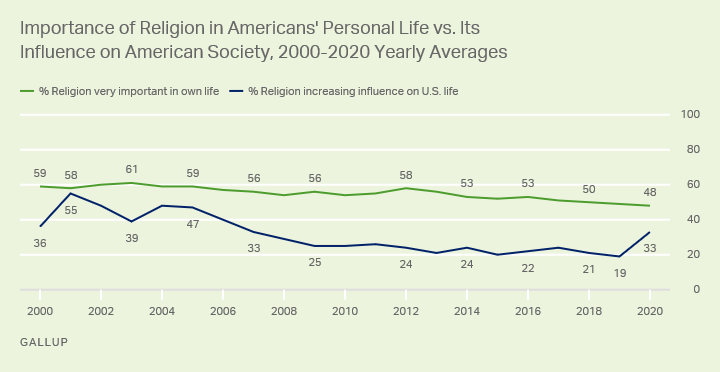
Line graph. Average percentages of Americans who say religion is very important in their own lives vs. their view that religion as a whole is increasing its influence on American life between 2000 and 2020. In 2020, an average of 48% said religion was very important in their own life, and 33% said the influence of religion on American life was increasing. This marked a 14-point uptick in views about religion's influence from 2019, while the percentage saying it is very important to them personally was at its record low-point.
Importance of Religion
In addition to the average 48% of Americans who, in 2020, said religion is "very important" in their lives, 25% rated it "fairly important" and 27% "not very important." These readings are essentially unchanged from those in 2019; however, the very important reading is the lowest on record by one percentage point.
When Gallup first asked Americans to rate the importance of religion in their lives in 1952, 75% said it was very important. That percentage was roughly the same when the question was next asked, in 1965, but by 1978, it had dropped to 52%.
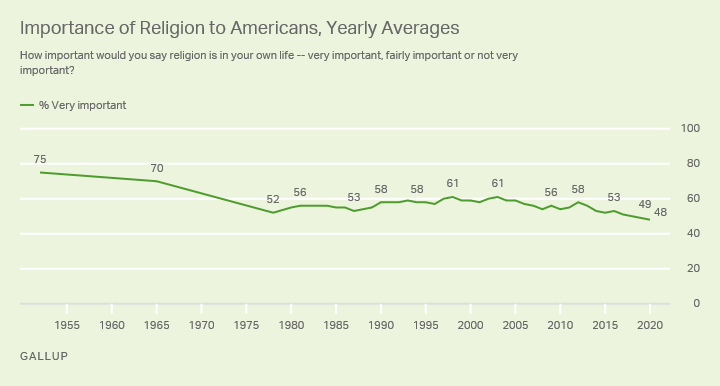
Line graph. Average annual percentages of Americans who think religion is very important in their own lives from 1952 through 2020. The 2020 data shows a record low 48% saying religion is very important in their lives. The record high was 75% in 1952.
Since 1978, the percentage of Americans identifying religion as very important has fluctuated, rising above 61% in only two single readings: 64% in 2001 after the 9/11 terrorist attacks and 65% one year later.
Religious Service Attendance
Thirty percent of Americans in 2020 -- a record-low yearly average for this metric -- said they had attended a church, synagogue or mosque in the prior seven days. This marked a slight decrease from the average 34% who reported attending in 2019 and the previous low of 32% in 2018.
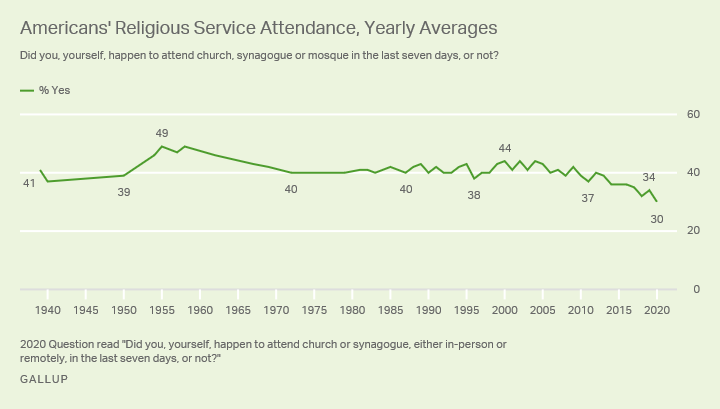
Line graph. Annual averages for Americans' self-reported attendance at a religious service at a church, synagogue or mosque in the previous seven days since 1939. The 2020 30% average is the lowest recorded by Gallup. The record high was 49% in 1958.
The latest decline is perhaps unsurprising given the effect of the pandemic on Americans' ability to physically attend houses of worship due to closures and capacity limitations. Yet, the rise of virtual worship services has provided another option, and Gallup's question in 2020 reflected that, asking whether Americans had attended "either in-person or remotely."
In April and May 2020, 27% and 28% of U.S. adults, respectively, said they were attending services remotely, and fewer than 5% were physically on-site. By December, however, as restrictions had been lifted in many places, 16% reported they were participating remotely and 13% in person.
Religious Identification
The 2020 average of Americans' religious preferences is in line with readings from the past few years. While the 45% of U.S. adults who say they are Protestant or another Christian denomination is Gallup's lowest yearly average reading for the group since 1992, it is not statistically different from 47% readings in 2015, 2016 and 2019.
Meanwhile, in 2020, 25% of Americans said they are Catholic, and 2% were Jewish. Over the past two decades, the proportions of Americans without a religious identity have more than tripled from 6% in 2000 to 19% in 2020.
| 2020 average preference | |||||||||||||||||||||||||||||||||||||||||||||||||||||||||||||||||||||||||||||||||||||||||||||||||||
|---|---|---|---|---|---|---|---|---|---|---|---|---|---|---|---|---|---|---|---|---|---|---|---|---|---|---|---|---|---|---|---|---|---|---|---|---|---|---|---|---|---|---|---|---|---|---|---|---|---|---|---|---|---|---|---|---|---|---|---|---|---|---|---|---|---|---|---|---|---|---|---|---|---|---|---|---|---|---|---|---|---|---|---|---|---|---|---|---|---|---|---|---|---|---|---|---|---|---|---|
| % | |||||||||||||||||||||||||||||||||||||||||||||||||||||||||||||||||||||||||||||||||||||||||||||||||||
| Protestant/Other Christian | 45 | ||||||||||||||||||||||||||||||||||||||||||||||||||||||||||||||||||||||||||||||||||||||||||||||||||
| Catholic | 25 | ||||||||||||||||||||||||||||||||||||||||||||||||||||||||||||||||||||||||||||||||||||||||||||||||||
| Jewish | 2 | ||||||||||||||||||||||||||||||||||||||||||||||||||||||||||||||||||||||||||||||||||||||||||||||||||
| Mormon | 1 | ||||||||||||||||||||||||||||||||||||||||||||||||||||||||||||||||||||||||||||||||||||||||||||||||||
| Muslim | 1 | ||||||||||||||||||||||||||||||||||||||||||||||||||||||||||||||||||||||||||||||||||||||||||||||||||
| None | 19 | ||||||||||||||||||||||||||||||||||||||||||||||||||||||||||||||||||||||||||||||||||||||||||||||||||
| Other/Undesignated | 7 | ||||||||||||||||||||||||||||||||||||||||||||||||||||||||||||||||||||||||||||||||||||||||||||||||||
| GALLUP | |||||||||||||||||||||||||||||||||||||||||||||||||||||||||||||||||||||||||||||||||||||||||||||||||||
Influence of Religion on American Life
Gallup has measured Americans' views of whether religion as a whole is increasing or losing its influence on American life since 1957. With the exception of three readings -- 69% in 1957, 71% in December 2001 and 53% in March 2002 -- no more than half of the public has viewed religion as gaining influence.
Yet, just as Americans' views on this measure were altered by the 9/11 terrorist attacks, the coronavirus pandemic appears to have affected perceptions. The percentage of U.S. adults saying the influence of religion was increasing rose 19 points to 38% between December 2019 and April 2020. By December 2020, it had fallen back to 27%.
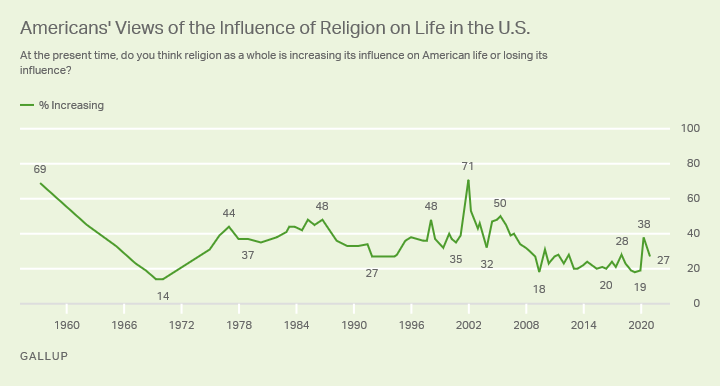
Line graph. Percentages of Americans who think religion as a whole is increasing its influence on American life since 1957. The latest 27% in December 2020 is below April's 38% but higher than recent prepandemic readings. The record high was 71% after the 9/11 terrorist attacks.
Combining the April and December measures, 33% of Americans on average last year said the influence of religion on society was increasing, which was a 14-point rise from 2019. While there were no differences between the 2019 and 2020 readings among some subgroups, such as age or specific religious affiliation, others showed modest differences.
Those who identify with a religion were more likely than those who do not to think religion's influence was increasing. Likewise, U.S. adults who say religion is very important were more likely than those who consider it fairly or not very important to think the influence of religion was increasing. Conservative and moderate Americans were more likely than liberals to perceive this rise.
| 2019 Average | 2020 Average | 2019-2020 change | |||||||||||||||||||||||||||||||||||||||||||||||||||||||||||||||||||||||||||||||||||||||||||||||||
|---|---|---|---|---|---|---|---|---|---|---|---|---|---|---|---|---|---|---|---|---|---|---|---|---|---|---|---|---|---|---|---|---|---|---|---|---|---|---|---|---|---|---|---|---|---|---|---|---|---|---|---|---|---|---|---|---|---|---|---|---|---|---|---|---|---|---|---|---|---|---|---|---|---|---|---|---|---|---|---|---|---|---|---|---|---|---|---|---|---|---|---|---|---|---|---|---|---|---|---|
| % | % | pct. pts. | |||||||||||||||||||||||||||||||||||||||||||||||||||||||||||||||||||||||||||||||||||||||||||||||||
| U.S. adults | 19 | 33 | +14 | ||||||||||||||||||||||||||||||||||||||||||||||||||||||||||||||||||||||||||||||||||||||||||||||||
| Identify with a religion | 18 | 34 | +16 | ||||||||||||||||||||||||||||||||||||||||||||||||||||||||||||||||||||||||||||||||||||||||||||||||
| No religious identification | 20 | 29 | +9 | ||||||||||||||||||||||||||||||||||||||||||||||||||||||||||||||||||||||||||||||||||||||||||||||||
| Religion is very important to me | 21 | 39 | +18 | ||||||||||||||||||||||||||||||||||||||||||||||||||||||||||||||||||||||||||||||||||||||||||||||||
| Fairly important | 13 | 25 | +12 | ||||||||||||||||||||||||||||||||||||||||||||||||||||||||||||||||||||||||||||||||||||||||||||||||
| Not very important | 21 | 29 | +8 | ||||||||||||||||||||||||||||||||||||||||||||||||||||||||||||||||||||||||||||||||||||||||||||||||
| Conservative | 18 | 33 | +15 | ||||||||||||||||||||||||||||||||||||||||||||||||||||||||||||||||||||||||||||||||||||||||||||||||
| Moderate | 16 | 32 | +16 | ||||||||||||||||||||||||||||||||||||||||||||||||||||||||||||||||||||||||||||||||||||||||||||||||
| Liberal | 23 | 32 | +9 | ||||||||||||||||||||||||||||||||||||||||||||||||||||||||||||||||||||||||||||||||||||||||||||||||
| GALLUP | |||||||||||||||||||||||||||||||||||||||||||||||||||||||||||||||||||||||||||||||||||||||||||||||||||
Bottom Line
Although the coronavirus pandemic has wreaked havoc on many aspects of Americans' lives in the past year, it did not alter the importance of religion in their lives -- either magnifying or diminishing it -- or affect their religious identification. The simultaneous decline in religious service attendance is understandable in light of the physical restrictions people were under. Although virtual attendance was eventually an option for many, the older skew of religious Americans' age profile may have limited the numbers attending virtually. And with attendance down, so was self-reported membership in a church, synagogue or mosque.
Despite this, Americans became more likely to think religion as a whole is gaining influence in the U.S. While the public may perceive a change in the influence of religion during a national crisis, as they did after the 9/11 terrorist attacks, there is no concrete evidence that religion is becoming more influential.
Learn more about how the Gallup Poll Social Series works.

